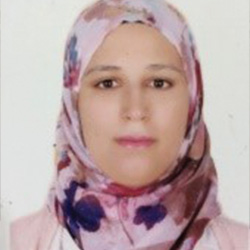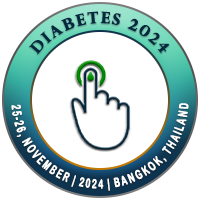
Maram Ben Salem
University of Medicine of Tunis , TunisiaTitle: Therapeutic Adherence in Primary Adrenal Insufficiency
Abstract
Background: Adherence to glucocorticoid therapy is essential for patients with primary adrenal insufficiency (PAI) to prevent acute adrenal crisis. The aim of our study was to evaluate the level of patient adherence to hydrocortisone during PAI and to determine the factors associated with nonadherence.
Methods : We conducted a cross sectional study in 58 patients with PAI. Each patient had an evaluation of drug adherence by the Girerd adherence scale, an evaluation of the knowledge of the disease using a preset questionnaire and an assessment of the quality of life using the AddiQoL questionnaire. The clinical and paraclinical characteristics of the patients were assessed and compared according to the therapeutic adherence level.
Results : The mean age of our patients was 48.4±13.3 years (39 women and 19 men). Therapeutic adherence was good in 9% of the participants, medium in 45% and poor in 46%. Factors associated with low adherence, after multivariate analysis, were age less than 48 years, lack of social security, cortisol level at time of diagnosis higher than 5 µg/dl and low cumulated doses of hydrocortisone (respectively p=0.021 ; 0.017 ; 0.024 ; 0.017). ). A positive correlation was found between the mean score of Girerd scale and the knowledge score (r=0.29; p=0,027).
Poor adherence was associated with high prevalence of acute adrenal crisis and lower body mass index, waist circumference, systolic blood pressure, fasting blood glucose and triglyceride levels (respectively: p= 0.024 ; 0.017 ; 0.034 ; 0.07 ; 0.034 ; 0.004). A positive correlation was found between the Girerd score and the AddiQoL score (r=0.33 ; p=0.01).
Conclusion : Poor adherence to hydrocortisone is frequent in patients PAI. It is associated with higher prevalence of acute adrenal crisis and an altered quality of life. It is positively correlated with the level of knowledge of the patients. Regular evaluation of patient’s compliance and reinforcing therapeutic education may improve patients’ prognosis.
Biography
Maram Ben Salem is a medical doctor specialized in endocrinology. She obtained medical PHD from the college of medicine of Tunis. She worked as a medical fellow in endocrinology in different departments of endocrinology in Tunis. She has published many researches and she is especially dedicated to researches regarding the adrenal gland.

